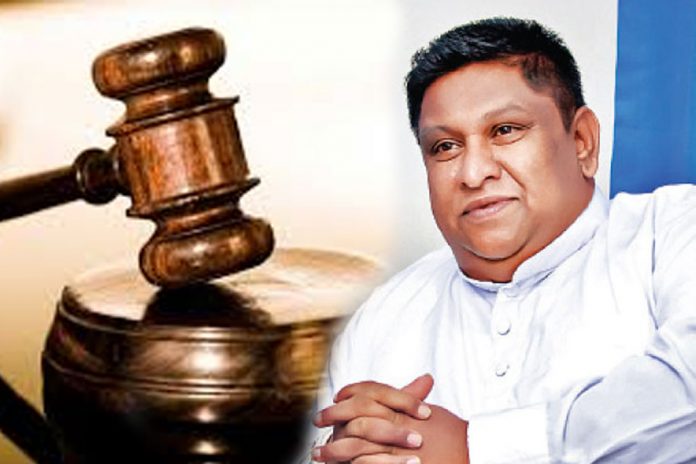Chamara Sampath Dassanayake in the Spotlight Over Alleged Corruption Charges
By: Ovindi Vishmika
April 06, Colombo (LNW): Badulla District MP Chamara Sampath Dassanayake, a prominent figure in the New Democratic Front (NDF), is currently facing serious corruption charges related to his tenure as the Chief Minister of Uva Province in 2016.
The case has garnered significant attention, with allegations of financial misconduct and misuse of public funds.
The core of the allegations revolves around the misuse of funds meant for a project intended to provide school bags to preschool children in Uva Province. According to the Bribery Commission, Dassanayake solicited funds from three state banks, claiming that the money would be used for the procurement of school bags for children. Two of the banks—Bank of Ceylon and another state-run institution—agreed to provide the funds, granting Rs. 1 million and Rs. 2.5 million, respectively.
However, the money that was supposed to be used for the project was allegedly transferred into Dassanayake’s personal foundation account, which raised questions about the legitimacy of the entire transaction. When the third bank refused to provide the requested funds, Dassanayake reportedly took drastic measures. In retaliation, he allegedly withdrew fixed deposits belonging to the Uva Provincial Council from that third bank. These actions led the Bribery Commission to claim that Dassanayake caused a financial loss of Rs. 17.3 million to the government.
The Arrest and Court Proceedings
Dassanayake was arrested by the Bribery Commission on March 27 after he provided a statement about the allegations. He was subsequently brought before the Colombo Magistrate’s Court, where he faced multiple corruption charges. The court granted him bail on two of the charges, setting the conditions at a cash bail of Rs. 50,000 and two sureties of Rs. 5 million each. In addition, an overseas travel ban was imposed, and Dassanayake was ordered to surrender his passport to the court.
However, despite being granted bail for two of the charges, Dassanayake remains in remand custody over a third charge related to the withdrawal of the Uva Provincial Council’s fixed deposits. The Bribery Commission alleges that this particular action resulted in a significant financial loss to the government. The Colombo Magistrate’s Court has ordered Dassanayake to remain in remand until April 8, 2025, as investigations into the matter continue.
The Government’s Response
The allegations against Dassanayake have sparked a broader conversation about corruption within Sri Lanka’s political landscape. As a member of the opposition, Dassanayake’s case has drawn attention not just for the details of the alleged crime but also for its potential political ramifications. The New Democratic Front (NDF), of which Dassanayake is a part, has yet to make an official statement regarding the charges, and it remains to be seen how this case will affect the party’s image moving forward.
The Bribery Commission, however, has stated its commitment to pursuing justice in this case and has made it clear that it will continue its investigation. The case is also significant in the broader context of Sri Lanka’s fight against corruption, as it involves a senior politician accused of exploiting his position for personal gain.
At the same time,the case has captured the public’s attention, particularly as it involves a high-ranking politician. Media outlets have closely followed the proceedings, with many questioning the effectiveness of Sri Lanka’s anti-corruption measures. In a country where corruption scandals are often linked to powerful political figures, this case stands as a test of the Bribery Commission’s ability to hold influential individuals accountable for their actions.
Moreover, the ongoing investigation has raised concerns about the transparency and accountability of public office holders, especially at the provincial level. If proven guilty, Dassanayake could face severe consequences, not only in terms of legal penalties but also in his political career.
What’s Next?
At present, the investigation into Chamara Sampath Dassanayake’s alleged corruption is still ongoing, with the Bribery Commission continuing to gather evidence. The Colombo Magistrate’s Court has ordered Dassanayake to remain in remand until April 8, 2025, while the investigation into the third charge continues.
For Dassanayake, the road ahead is uncertain. While he has been granted bail for two of the charges, the court’s decision to keep him in remand for the third charge indicates that the authorities are taking these allegations seriously. The outcome of the case could have serious implications, not just for Dassanayake but also for the NDF and Sri Lanka’s political scene as a whole.
As the investigation continues, more developments are expected. Whether or not the allegations against Dassanayake will lead to a conviction remains to be seen, but this case has undoubtedly become a key point of focus in Sri Lanka’s ongoing battle against corruption.
The next few weeks are likely to provide further updates, and the public is keen to see how the legal process unfolds. Whether this case will result in significant political fallout or lead to reforms in how corruption is handled within Sri Lanka’s political system is still uncertain. For now, all eyes remain on the ongoing investigations and the eventual court ruling.

